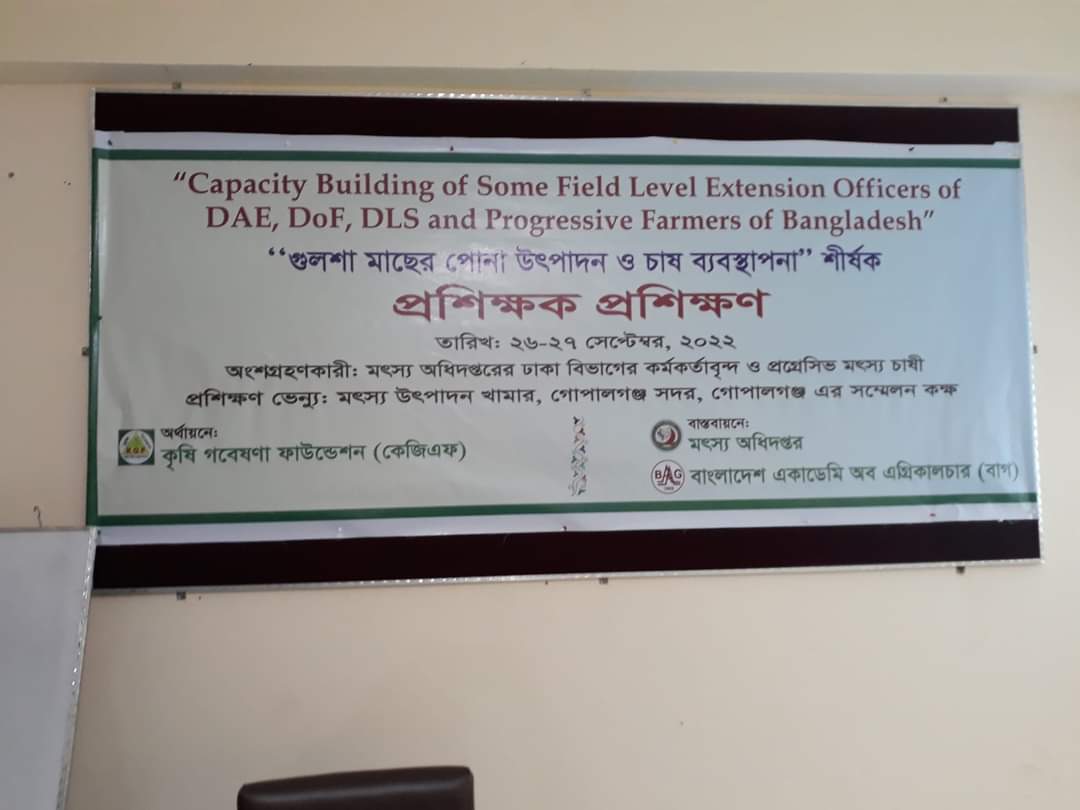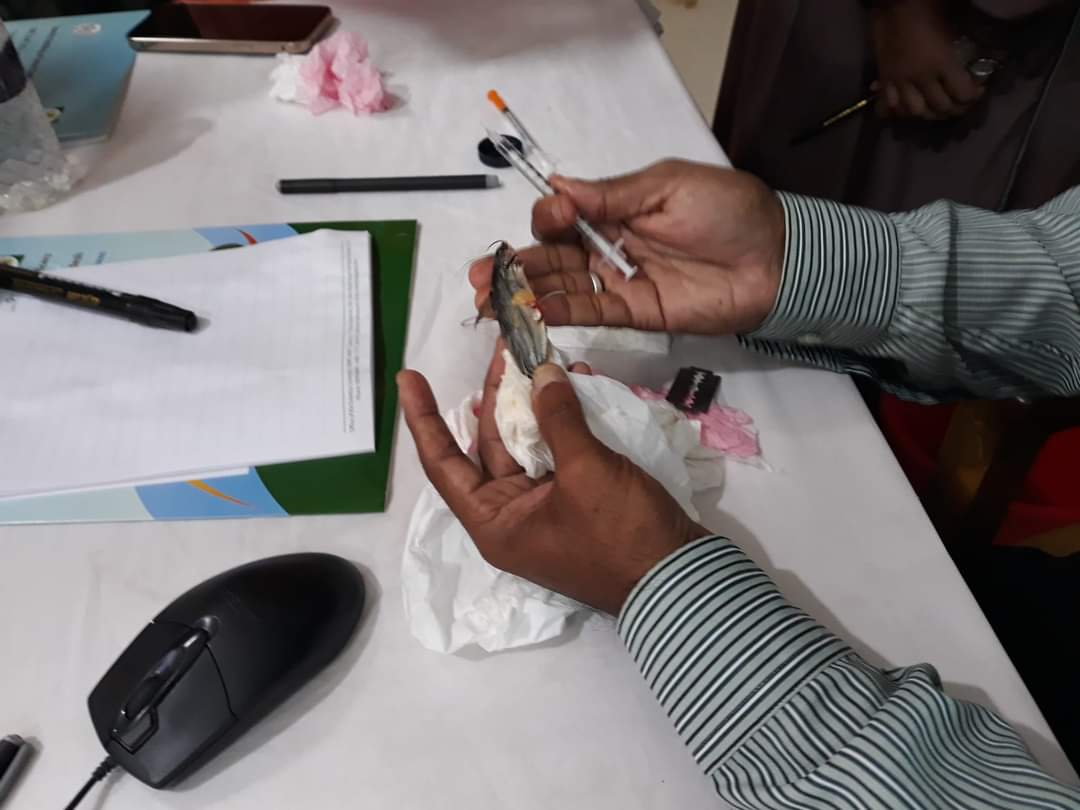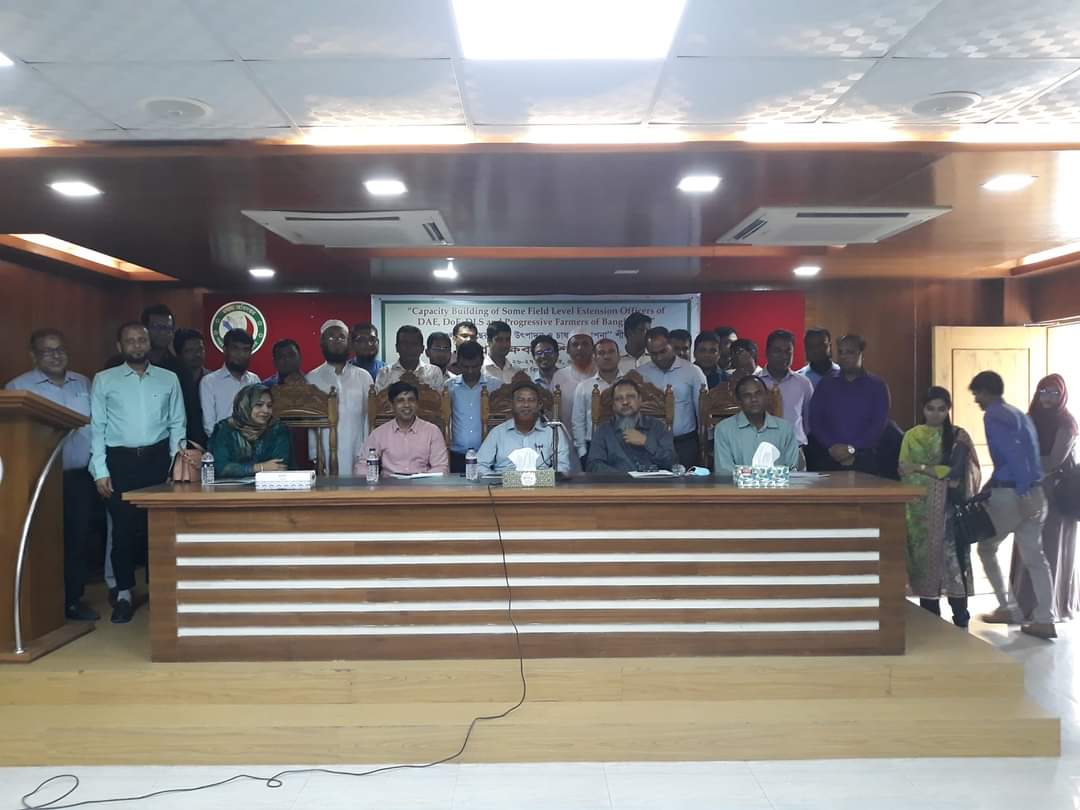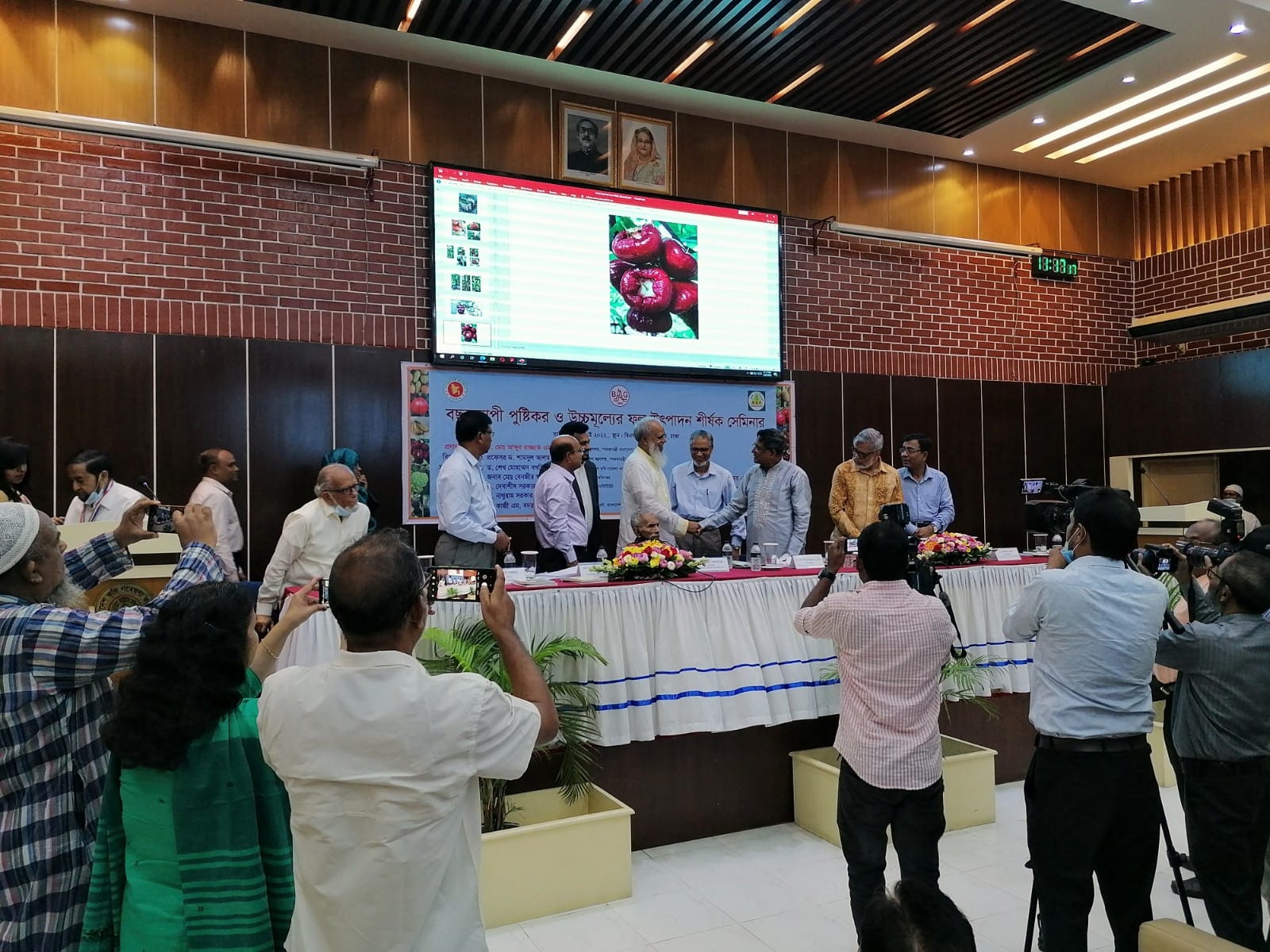Bangladesh Academy of Agriculture (BAAG) |

|
|---|
Bangladesh Academy of Agriculture (BAAG) is a not-for-profit professional organization of senior agriculturists and agricultural scientists from agriculture, fisheries, livestock, and forestry. It was established in 1993 and registered in 1994 under Joint Stock Company (Reg. No. C324 (12) 94) and the NGO Bureau (Reg. No. 1368). It is located at Dhaka. The members of BAAG are called Fellows. There are 42 fellows now in BAAG. Every year new Fellows are inducted. To be a fellow, one must be at least 45 year old with significant contribution in the respective field. BAAG has an 13-member executive council who are elected through vote by the General Members for two years. The Executive Council has one President, one Vice-President, one General Secretary, one Treasurer and nine members.
What BAAG DoesBAAG values traditional knowledge and innovations by the farmers. The BAAG is a platform for sharing knowledge among the field practitioners, scientists, development professionals and policy makers in the field of agriculture including fisheries, forestry and livestock. BAAG organizes seminar, workshops and round table discussions to bring all stakeholders together to discuss the critical issues. Through discussion it identifies needs for the country, traditional knowledge, advance knowledge and possible interventions for sustainable agriculture. BAAG also helps in establishing linkages between organizations and the farmers in exchanging knowledge and technologies. BAAG implements action research involving farmers on different technologies suitable for different agroecological zones. The lessons are shared with the scientists and development workers in the country. BAAG undertakes research and development activities on nationally important issues either with its own fund or securing fund from development partners.
Photo Archive
Updates
In Loving Memory of Dr. Md. Anwarul Quader Shaikh
Former Director General, Bangladesh Institute of Nuclear Agriculture (BINA)
On behalf of the Fellows of the Bangladesh Academy of Agriculture, I extend our deepest condolences on the passing of Dr. Md. Anwarul Quader Shaikh, who left this world at 10:30 PM on 2 October 2025 at Bangladesh Specialized Hospital, Dhaka. Inna Lil
In Loving Memory of Dr. Md. Anwarul Quader Shaikh
Former Director General, Bangladesh Institute of Nuclear Agriculture (BINA)
On behalf of the Fellows of the Bangladesh Academy of Agriculture, I extend our deepest condolences on the passing of Dr. Md. Anwarul Quader Shaikh, who left this world at 10:30 PM on 2 October 2025 at Bangladesh Specialized Hospital, Dhaka. Inna Lillahi Wa Inna Ilayhi Raji'un.
Dr. Shaikh’s departure marks the loss of one of Bangladesh’s most eminent agriculturists. His pioneering contributions to nuclear agriculture—particularly in the development of crop mutant varieties—have profoundly advanced our nation’s food security and agricultural innovation. His expertise was not only recognized nationally but also internationally, through his service on Expert Missions of the FAO-IAEA Joint Programme in multiple countries.
Throughout his distinguished career, Dr. Shaikh embodied excellence, integrity, and unwavering dedication. His legacy will continue to inspire generations of scientists, researchers, and development professionals. His contributions have left an enduring imprint on Bangladesh’s agricultural landscape and will be remembered with deep respect and admiration.
Dr. Shaikh also served as Vice President of the Bangladesh Academy of Agriculture for several years, discharging his responsibilities with the highest degree of professionalism and commitment.
May Almighty Allah, in His infinite mercy, grant Dr. Shaikh the highest place in Jannatul Ferdous, and may He bring peace, strength, and solace to his bereaved family during this time of sorrow. Please accept our heartfelt sympathy and prayers for comfort and healing.
With profound respect and sorrow,
Prof. Lutfur Rahman
President
Bangladesh Academy of Agriculture
Training on Technologies for production of fingerlings and aquaculture of Gulsha fish
BAAG in collaboration with Bangladesh Fisheries Research Institute has trained 25 fisheries extension officers on production of fingerlings of Gulsha during BAAG in collaboration with Bangladesh Fisheries Research Institute has trained 25 fisheries extension officers on production of fingerlings o
Training on Technologies for production of fingerlings and aquaculture of Gulsha fish
BAAG in collaboration with Bangladesh Fisheries Research Institute has trained 25 fisheries extension officers on production of fingerlings of Gulsha during BAAG in collaboration with Bangladesh Fisheries Research Institute has trained 25 fisheries extension officers on production of fingerlings of Gulsha during 25 - 27 September 2022. The training was organized under BAAG-KGF project on ‘Capacity building of extension officers and farmers on improved technologies. The training was held in Gopalganj.
BAAG Organized a Seminar
Bangladesh Academy of Agriculture organized a seminar jointly with Department of Agricultural Extension, Bangladesh Agricultural Research Institute and Krishi Gobeshona Foundation on year-round high-value nutritious fruits in Bangladesh which was held on 23 July 2022 at the auditorium of Bangladesh
BAAG Organized a Seminar
Bangladesh Academy of Agriculture organized a seminar jointly with Department of Agricultural Extension, Bangladesh Agricultural Research Institute and Krishi Gobeshona Foundation on year-round high-value nutritious fruits in Bangladesh which was held on 23 July 2022 at the auditorium of Bangladesh Agricultural Research Council. Hon'ble Minister for Agriculture Dr Md. Abdur Razzak was present in the seminar as Chief Guest.
KGF awarded a project to BAAG
Krishi Gobeshona Foundation (KGF) has awarded a project to the Bangladesh Academy of Agriculture entitled, ‘Capacity Building for Some Field Level Extension Workers of DAE, DOF and DLS and Some Progressive Farmers of Some Selected Areas of Bangladesh’. The project will commence from November 202
KGF awarded a project to BAAG
Krishi Gobeshona Foundation (KGF) has awarded a project to the Bangladesh Academy of Agriculture entitled, ‘Capacity Building for Some Field Level Extension Workers of DAE, DOF and DLS and Some Progressive Farmers of Some Selected Areas of Bangladesh’. The project will commence from November 2021 and continue till October 2024. Through this project 1800 front line staff of Department of Agriculture (DAE), Department of Fisheries (DOF) and Department of Livestock Services (DLS) along with progressive farmers will be trained (ToT) on advanced agricultural technologies for achieving food security in Bangladesh. The total costs of the project is BDT 16,140,000.
Felicitations to Dr. Kazi Bdruddoza
Heartiest Felicitations to Scientist Emeritus Dr. Kazi M. Badruddoza for the Standard Chartered Bank-Chennel i Agro-Award 2020 for His Great Role in Institutionalization and Lifetime Contribution in Agricultural Research and Development in Bangladesh. On Behalf of the Fellows of Bangladesh Acad
Felicitations to Dr. Kazi Bdruddoza
Heartiest Felicitations to Scientist Emeritus Dr. Kazi M. Badruddoza for the Standard Chartered Bank-Chennel i Agro-Award 2020 for His Great Role in Institutionalization and Lifetime Contribution in Agricultural Research and Development in Bangladesh.
On Behalf of the Fellows of
Bangladesh Academy of Agriculture (BAAG)
Dr. M.A. Mazid
General Secretary
Executive Council Meeting Held on 22 August 2020
A meeting of the Executive Council was held on 22 August 2020. The meeting was Chaired by Scientist Emeritus Dr. Kazi M. Badruddoza. Mr. Mohammed Masum, Dr. Shahidul Islam, Dr. Shamsul Alam, Hamidur Rahman, Dr. M.A. Mazid were present physically in the meeting while Farid Uddin Ahmed, Dr. Baki and D
Executive Council Meeting Held on 22 August 2020
A meeting of the Executive Council was held on 22 August 2020. The meeting was Chaired by Scientist Emeritus Dr. Kazi M. Badruddoza. Mr. Mohammed Masum, Dr. Shahidul Islam, Dr. Shamsul Alam, Hamidur Rahman, Dr. M.A. Mazid were present physically in the meeting while Farid Uddin Ahmed, Dr. Baki and Dr. Salina Banu were present virtually through Zoom.
The meeting started with offering doa for recently departed Prof. Dr. Altaf and Prof. Siddique of BAU, Dr. Al Amin of BARI, Dr. Nazmul Hasan of Dept of Fisheries, Mr. ATM Salehuddin Chowdhury, former Director General of Bangladesh Sugarcrop Research Institute and all others who were either involved in agricultural research, education and extension but died either due to Covid-19 or any other ailments since March 2020.
The meeting decided to take initiatives to promote high value fruit trees to address national nutritional requirements in northern Bangladesh especially Panchagorh and Nilphamari districts. Dr. Salina Banu and Hamidur Rahman shall take necessary steps in this regard.
Silver Jubilee of BAAG Celebrated
BAAG celebrated its 25 years (Silver Jubilee) on September 27, 2018 at Krishibid Institute, Bangladesh (KIB) located at Farmgate, Dhaka. Matia Chowdhury MP, Hon'ble Minister for Agriculture, Government of the People's Republic of Bangladesh was the Chief Guest and Dr. Ali Akbar, Vice-Chancello
Silver Jubilee of BAAG Celebrated
BAAG celebrated its 25 years (Silver Jubilee) on September 27, 2018 at Krishibid Institute, Bangladesh (KIB) located at Farmgate, Dhaka. Matia Chowdhury MP, Hon'ble Minister for Agriculture, Government of the People's Republic of Bangladesh was the Chief Guest and Dr. Ali Akbar, Vice-Chancellor, Bangladesh Agricultural University was the Special Guest in the occasion. Dr. Kazi M. Badruddoza, National Scientist Emeritus presided over the meeting. More than 200 agriculturists and scientists attended the Silver Jubilee of BAAG.
Dr. Kazi M. Badruddoza, National Scientist Emeritus and President of BAAG presented the keynote speech. The theme of the keynote speech was 'Vision of BAAG for 2030 and beyond for achieving SDG'
The plenary session of the 25th anniversary celebration program of BAAG was conducted by Prof. Lutfur Rahman with support from Mr. Farid Uddin Ahmed and Prof. Amin Uddin Mridha.
1. Maximum utilization of land with improved management practices such as IPM, ICM and IFM can lead to food self-sufficiency. As art of the programs there can be attempts to study and define the transformation of field crop agriculture to horticulture and other commodities to help Nutritional Food Security at Household level. BAAG may help in creating mass awareness.
2. Bangladesh Academy of Sciences has been supporting agricultural research for quite some time. It appears that they have some fund from some sources. Such fund should have been with Bangladesh Academy of Agriculture. It is believed that if BAAG had the fund, the research should have been more focused and need based. Thus, there is need for getting organized government approved endowment fund for R&D activities of the Institutes/Universities and privately developed labs only on programs determined for public-private partnership.
3. There is need for an integrated agricultural policy (encompassing crops, fisheries and livestock and forestry) rather than focusing only on crops. BAAG should start taking steps to contribute in developing such an Agricultural Policy taking funds from the donors like KGF, NATP, UGC, & BAS.
4. There should have an Agricultural Price Policy. BAAG should arrange a seminar or workshop to have inputs on that. The BAAG Fellow Dr. Jahangir Alam may be requested to share his opinion on the issue and the ways to organize the program along with invitees to participate. All logistic support will be given from the BAAG secretariat.
5. Dr. Kazi M. Badruddoza should be the Chief Editor of BAAG Journal. There is need for taking decision in this respect in the Executive Committee meeting of the BAAG
6. BAAG Journal should be mainly on policy issues. There is therefore, need for motivation among the fellows and others of the fields to kindly take initiatives in their own fields to write papers on policy issues for the journal. There is lack of such papers. The BAAG has open ended circular about such papers from at least now on. Initially a team of experts can identify the fields on which the policy papers will be written and who are those experts and the next issue of the journal can be only for that purpose.
7. BAAG can undertake initiatives to support breeders for developing more high yielding varieties and extend all help to get the IPR on new plant variety or technology generated by the breeders and other scientists. There is need for discussion on this issue because till now there is low level of participation in the variety R&D at private level who are require to be associated for seed production and marketing of the IPR protected varieties. On the other hand allowing IPR to public institutional breeders may block the use of those materials for faster and further development of newer varieties. Let us be cautious and discuss this issue in a meeting to be organized by BAAG requesting Prof. S.R. Bhuiyan to kindly give a note to start discussing the issue for solution to suggest to the appropriate authority.
8. There has been close to food self-sufficiency in Bangladesh, so now there is need for safe food and nutritional food security. Now therefore the BAAG can or should organize discussion on how to improve food safety issues including programs of motivation for Nutritional Food Security as an in built approach in varieties and breeds. The safe food should focus on the safe food now, as we have been addressing both food and nutrition security in recent years.
9. The policy makers and implementers in the fields of agriculture in its widest form should be very careful in deciding the programs based on future climate change issues mostly for “Water Use Efficient†be the plant varieties or the species and or other technology and management systems. In order to support for good decision by the policy makers BAAG as an apex body covering all disciplines can take up programs to delineate the fields through discussion at expert level.
10. Access to low interest credit facilities should be given for mechanized cultivation, post-harvest processing of products for value addition by farming community or CBOs, nurserymen and newly developed entrepreneur, contract farming groups and the private sector activities.
11. Bangladesh still

















